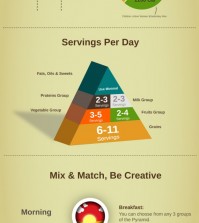- Make It Yourself Lavender Heart-Shaped Bath Bombs!
- 20 Things You Never Knew About “Down There”
- 12 Best Foods For Those Suffering From Arthritis Pain
- 12 Personal Hygiene Mistakes Almost Everyone Makes (Mom Never Told You About #4!)
- 15 Medicinal Plants And Herbs From The Cherokee People
- 12 Mind-Blowing Benefits Of Drinking Coconut Water During Pregnancy
- 12 Outstanding Winter Foods That Won’t Fatten You Up Like A Christmas Turkey
12 Ways To Treat ADHD Without Drugs (#8 Is Quite Different)

Photo credit: bigstock.com
Attention Deficit Hyperactivity Disorder, or ADHD, is a problem that affects millions of children as well as adults. This developmental neuropsychiatric disorder is one of the most common disorders among children, occurring more often in males than females.
Some of the key behaviors of a person who suffers from ADHD are inattention, impulsivity, and hyperactivity. Persons with this disorder often have difficulty paying attention, difficulty following instructions, problems with organization, and becoming bored quite quickly. They can also become easily distracted, forget things quickly, and occasionally talk or laugh excessively. Although many children outgrow this disorder as they age, some people never completely outgrow the problem.
Although the exact cause of this disorder is not fully understood, there are certain factors that are known to contribute, at least in part, to its development. Some of the biggest factors involved are central nervous system problems, genetics, and environmental factors. Some researchers also believe that exposure to environmental toxins, maternal drug use, alcohol consumption, or smoking during pregnancy can also be factors.
A proper diagnosis is also important before trying any type of treatment or herbal program.
Most doctors will quickly try to push prescription drugs on your child, but that should really be a last resort. There are numerous other ways you can deal with ADHD that do not involve toxic drugs. We have a list of the top 12 ways to deal with ADHD naturally.
1. Technology Time Outs
In today’s world, most kids are perpetually plugged in, texting, watching videos on their phones or tablets, playing computer games, and watching television for hours. This constant stimulation not only exposes our children to EMR (electromagnetic radiation) at potentially dangerous levels, but it also fragments their attention. When you are constantly scrolling Facebook or watching two-minute videos, we are training our brains to work on that level. Sleep problems, headaches, memory and attention problems, as well as chronic fatigue are all possible side effects of EMR. Limit your child’s screen time exposure to no more than one or two hours each day.
2. Exercise
The journal Neurotoxicity Research published a study in 2012 finding that regular exercise was not only beneficial in fighting stress, feelings of anxiety, depression, negative behavior and poor impulse control, but it was also linked to improved memory and less compulsive behavior. Research suggests that exercising in green, open spaces, such as parks, improves the brain function in those with ADHD. Work to ensure that your child spends a minimum of 30 minutes a day doing some high energy exercise, especially if he can do it outdoors. Bike riding, playing soccer or basketball, swinging, playing on jungle gyms, or swimming are all excellent exercises. You might want to consider enrolling your child in activities that engage the entire body such as dancing, ice skating, martial arts, or gymnastics classes.
3. Calming Herbs
There are plenty of herbs that can naturally calm, soothe, as well as nourish the central nervous system. Some of the best herbs for this purpose are skullcap, lemon balm, chamomile, passion flower, valerian, and St. John’s Wort. These can be consumed as teas or tinctures. Speak with your doctor first for the proper dosage for your child.
Continue to Page 2
































